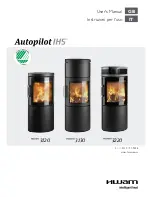
10
A single wall metal fluepipe is suitable for connecting the stove to the chimney but is
not suitable for using for the complete chimney. The chimney and connecting fluepipe
must have a minimum diameter of 125 mm.
Any bend in the chimney or connecting
fluepipe should not exceed 45°. 90°bends should not be used.
Combustible material should not be located where the heat dissipating through the
walls of fireplaces or flues could ignite it. Therefore when installing the stove in the
presence of combustible materials due account must be taken of the guidance on the
separation of combustible material given in Building Regulations Approved Document J
and also in these stove instructions.
If it is found that there is excessive draught in the chimney then either an adjustable
flue damper or alternatively a draught stabiliser should be fitted. The adjustable flue
damper should not close off the flue entirely but should in its closed position leave a
minimum continuous opening free area of at least 20 % of the total cross sectional
area of the flue or fluepipe.
Adequate provision e.g. easily accessible soot door or doors must be provided for
sweeping the chimney and connecting fluepipe.
You should also familiarise yourself with the draught conditions for chimneys with 2
flues.
The flue outlet spigot is either 150 mm (6”) in diameter, or 129 mm (5”) in diameter.
For strong draughts, the chimney or flue should be fitted with a draught stabiliser. In
which case, it is important to ensure that there is a free flow-through area of mini-
mum 20 cm² when the regulating gate is shut. Otherwise, the fuel energy may not be
used optimally. If, at any time, you are unsure about the condition of the chimney, you
should contact a chimney sweep.
Remember that access to the access door should be kept clear.
English
RAIS - Manual for RAIS Q-Tee











































